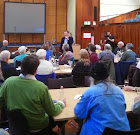 |
| Cormac Russell at the Assemblies for Democracy, April 18th, 2015 |
Over the last 30 years in particular, neoliberalism and globalisation
have done huge harm to local indigenous living and the major eco-systems
of the planet. Consequently, there is a growing global social movement
to put people and the planet before corporate interests and consumerism.
Here in the UK, one example of such citizen-led movements is the Assemblies for Democracy.
On Saturday 18 April 2015, I had the privilege of helping to host one of a number of Assemblies for Democracy in Manchester. The London and Glasgow Assemblies, which took place in March, echoed the core message of the Manchester gathering: neoliberalism is a blight on democracy and civic life; citizens must join in solidarity to re-assert the values of localism, and economic and environmental sovereignty.
Here in the UK, one example of such citizen-led movements is the Assemblies for Democracy.
On Saturday 18 April 2015, I had the privilege of helping to host one of a number of Assemblies for Democracy in Manchester. The London and Glasgow Assemblies, which took place in March, echoed the core message of the Manchester gathering: neoliberalism is a blight on democracy and civic life; citizens must join in solidarity to re-assert the values of localism, and economic and environmental sovereignty.
In the same vein, following the recent Greek elections, John McKnight, Peter Block and I wrote about the corrosive effects of globalisation and austerity on indigenous living, localism and the economic sovereignty of our democratically elected Governments. The election in Greece is an early fault line in the obscenity of the scarcity economic model that has created austerity and the global debt crisis, and is a sign of the emergence of neighborhood and community principles as the force guiding citizens and supportive Governments to take the future into their own hands.
There are many ways of describing such movements towards change, but what is common across all such movements is that they are place-based, citizen-led, relationship-driven, capacity-orientated and grounded in the principles of inclusion and social and environmental justice.
These are principles also at the heart of Asset Based Community Development (ABCD). ABCD simply describes what communities do in an inclusive way to grow more powerful and prevail. ABCD has a rich heritage, which as described here draws lessons from the Black Civil Rights movement in the United States, the thinking of Ivan Illich, and the practical experience of Alinsky-style Community Organising from the 1950s in Chicago neighbourhoods. Indeed John McKnight was one of the people who helped to train President Barack Obama to be a Community organiser in Chicago in 1986.
Obama's main assignment as an organiser was to launch the church-funded Developing Communities Project and, in particular, to organise residents of Altgeld Gardens to pressure Chicago's city hall to improve conditions in the poorly maintained public housing project. His efforts met with some success, but he concluded that, faced with a complex city bureaucracy, "I just can't get things done here without a law degree."
 |
| Barack Obama, the Community Organising Days |
ABCD however is primarily informed by what ordinary people (typically without law degrees or other formal credentials) in neighbourhoods say they do, and what they use, when they come together with their neighbours to make things better.
A Four Year Listening Exercise in 300 Neighbourhoods
In the late eighties, John and Jody along with eighteen of their colleagues at the Centre for Urban Studies (est. 1969) Northwestern University conducted a four year appreciative inquiry with 300 urban neighbourhoods in 20 cities across North America. As a consequence they gathered 3,000 plus case studies that exemplify how communities become more powerful. John and Jody have been very weary of suggesting that their findings [1] were in anyway generalisable, especially outside the North American context. Yet over and over again in Oceania, Asia, the Global South and Europe, communities and practitioners have reported resonances with how they see communities organise and the observations of the ABCD listening exercise.
In the late 1980s, this endeavour saw John McKnight and Jody Kretzmann travel across North America, visiting over 300 neighbourhoods in 20 cities. Along with a core group of associates they set out to identify the basic building blocks of healthy urban neighbourhoods.

Their findings therefore, correlate with the findings of hundreds of other practitioners who have conducted similar intentional inquiries, across the world since that time. [2] The sum of this 30 year plus global inquiry is a growing body of practice and associated learning that challenges some traditional approaches to solving urban and rural development problems, which focus service providers and funding agencies on the needs and deficiencies of neighbourhoods, towns and villages. [3] Kretzmann, McKnight and others have demonstrated that community assets are key building blocks in sustainable urban and rural community revitalisation efforts, and a critical starting point in addressing deep-rooted socio-economic issues.
These community assets include:
- the skills of local residents
- the power of local associations
- the resources of public, private and non-profit institutions
- the physical and economic resources of local places.
- the stories, culture and heritage of the local people and local places.
To anyone who has spent any amount of time in living neighbourhoods and witnessed the huge reservoir of human potential, the deficit-based perspective is of course a half-baked truth. Yet even if it were completely true, liberating external institutional resources, be it through grants or expertise, without first liberating local capacities results in top down, bureaucratic solutions that simply do not work, as is discussed here. Hence the deficit-based perspective has reached the limits of its capacity to liberate low-income communities.
Slowly and thoughtfully, the Asset-Based Community Development perspective is gaining momentum across Scotland among citizens, practitioners and policy makers who are committed to reducing institutionalisation and increasing interdependency in community life. As with any perspective, or approach, to community development, there will be false dawns and contradictions, and the language will be misappropriated by some, and hijacked by others to excuse the very opposite of what it is intended to enable.
ABCD is often misinterpreted as being against a focus on people’s needs, and being anti-institutions. It is neither. It is however against technocracy, and consumerism, and the dominant use of its primary tool to reach the marketplace: needs analysis, which nearly always concludes that what the people who are being analysed need, are the services of those who are analysing them.
Notwithstanding, savvy practitioners are figuring out how ABCD can apply in their local context, in a way that places due emphasis on the principles of social justice that are currently galvanising the people of Scotland. They, like their counterparts in many other jurisdictions, are actively working through and figuring out the most appropriate relationship between ABCD-like approaches and Self-Directed Support, Public Health, reform of the Criminal Justice Systems [6], Recovery communities, and a myriad of place based efforts, including Big Lottery Scotland’s Our Place II Initiative, in an effort to grow a homemade and handmade version of what works.
This will be an ongoing inquiry, since ABCD is a perspective, not a model, and cannot therefore be tied down to one version of (so-called) best practice, or another. In fact, when it comes to ABCD, best practice is the enemy of better practice, and the inhibitor of next practice.
The primary questions that ABCD posits are:
- What is it that citizens are best placed to do together on their own terms?
- What are citizens best placed to do, but with help from outside agencies?
- What are institutional systems including the state and not-for profits best placed to do?
Since institutions will nearly always seek to preserve the problems to which they believe they are the solution, the challenges that ABCD presents will of course raise the hackles of those who are more concerned with their institutional or ideological agendas than with the communities and individuals they serve.
That said there are many disruptive innovators and bone fide radicals within institutions in Scotland including the Scottish Government who are driven not by the desire to save their systems money, but to save people from being institutionalised by their systems and programmes. They understand people want a life first and a service in reserve. This is among the many reasons why Asset-based Community Development matters in Scotland.
Views expressed by guest bloggers may not reflect the views of What Works Scotland
References:
[1] John P. Kretzmann & John L. McKnight Building Communities from the Inside Out: A Path Toward Finding and Mobilizing a Community's Assets,
[2] Jeffrey C. Goldfarb The Politics of Small Things THE POWER OF THE POWERLESS IN DARK TIMES
[3] Paul Schmitz, Everyone Leads: Building Leadership from the Bottom Up, Chapter Six, “Connecting across Cultures,” pp 155-186. Jossey-Bass, 2012.
[4] John McKnight & Peter Block,
The Abundant Community: Awakening the Power of Families and Neighborhoods, SF, Barrett-Koehler Publishers, 2010. Chapters 5, 6 and 7, on Community Abundance in Action, Awakening the Power of Families and Neighborhoods, and the Power of Connectors (pp. 83-147).
[5] Mark Warren, Democracy and Association, Chapter Four, “The Democratic Effects of Association,” pp. 60-93.
[6] Cormac Russell, Making the Case for an Asset-Based Community Development (ABCD) Approach to Probation: From Reformation to Transformation, Irish Probation Journal, 2010, Volume 7, pp. 119-132

No comments:
Post a Comment
Note: only a member of this blog may post a comment.